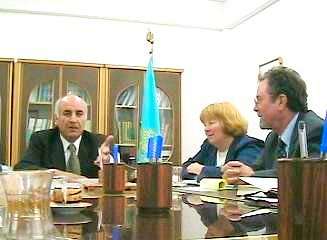Dr. Salman Al-Bdour,
President, Al Al-Bayt University
17-sep-03, 11 am
North of Amman, near the Syrian border,
the landscape is almost a desert, with rolling low hills.
Seemingly in the middle of nowhere we reach an armed compound,
surrounded by
guard towers and razor wire.
This is Al Al-Bayt University.
We are ushered to the office of Dr. Salman Al-Bdour, the president of
the University. His English is excellent and he is frank, charming,
and informative.
 We start with the usual niceties and are served coffee and tea.
We start with the usual niceties and are served coffee and tea.
Al-Bdour:
We now have conflict between extremists on both sides, and this
idea is relatively new here. He cites the book title
"Clash of Civilizations" and asks whether we have a conflict of
civilizations or of ideas.
Our current conflicts are between followers of religions, not between
the religions themselves.
He talks about al-Afghani, a 19th center thinker who wanted to unify
the monotheistic religions but found that is was impossible to unify even
one religion.
(Al-Bdour assumes that we know more about Islam than we actually do.
This is a change; most people assume that we're entirely ignorant of it.)
32 nationalities are represented here. There are 400 foreign students,
68 on full scholarship.
There are 14,000 students in all, 65% of them women.
Women get the same education as men, and there are women on the faculty
in almost all departments.
The University is only about 10 years old.
It is surrounded by olive groves, and eventually hopes to derive 25% of
its income from olive oil.
Al Al-Bayt University teaches many faiths but only monotheistic ones.
(He means that they don't teach anything like Buddhism or Hinduism.)
Seven different major schools of Islam are taught, and Dr. Al-Bdour
states that extremism arises when only one school is taught exclusively.
The school's teaching emphasizes reconciliation.
He notes that Saudis won't send students to Al Al-Bayt because they perceive
excessive Shiite influence.
In talking about extremism and cults, Dr. Al-Bdour noted that it
happens in America, too, pointing out the Waco, Texas events.
A question about how he deals with extremism in the student body led
to a discussion of Palestine, an issue that we would hear much about.
We asked him what would be the fundamentals of a lasting peace.
He was evasive on this but did emphasize that it must be a just peace.
He also emphatically accepted Israel's existence as a "fact".
U.S. activity, he said, damages all attempts at moderation in Jordan.
He tries to keep an open mind and hope for the best, but every U.S. action
seems to bring disappointment.
He says that Bush should "get a new speech writer" -- every time he speaks
he fans the flames. Al-Bdour cites the now-famous "crusade" quote as
a particularly inflammatory statement that has not been forgotten here.
He does admit, though, that "everyone trades on" the Palestine issue --
using the issue for their own ends.
|